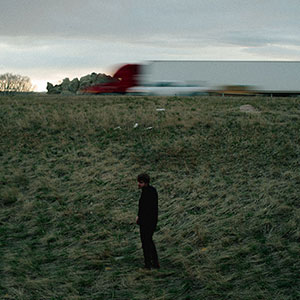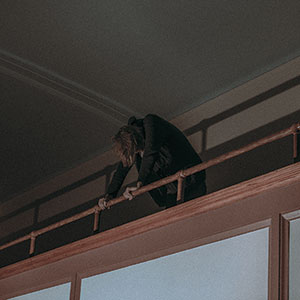Logan Farmer
Logan Farmer’s music has always held an air of disaster. With new full-length Nightmare World I See The Horizon, the Colorado-based songwriter continues to evolve the premise set by his previous albums, Still No Mother (2020) and A Mold For The Bell (2022). Those records charted the approach of imminent catastrophe through a chorus of distinct voices, characters who scratched around for dignity at a time when the fabric of their environment seemed to be tearing itself apart. The result was essentially the before and after overlaid. A mortal fear matched only by a premature sense of mourning for all that would soon be lost. But while Nightmare World continues the apocalyptic atmosphere, Farmer widens his gaze to engage not only with our encroaching doom, but also the forces which have brought it to bear, and the ways in which we are complicit in their perseverance.
Coming over three years after A Mold For The Bell, the album had the longest gestation period of any of Farmer’s releases, a fact which feels significant in light of its contemplative style. “The break gave me some time to reflect on my work and really consider what I was doing and why I was doing it,” he explains, and this self-interrogation grew into a key theme. Here the substance of the cataclysm is richer, darker, and more complex. Not so much a biblical rapture as the logical endpoint of a society driven by fear and greed. Something as present within every small luxury we consume as it is explicit in acts of destruction. A fate wrought unevenly according to systems of privilege and luck. On Nightmare World, there is still deep sadness, the same ever-present dread, but now these emotions are accompanied by shame.
With the help of an esteemed cast of contributors which includes Heather Woods Broderick, Annie Leeth (Faye Webster), and Patrick Lyons (Colter Wall), Farmer brings this world to life through his most ambitious sonic landscapes to date. Elements of slowcore and surf rock add new hues, though the most striking addition to his palette is the inspiration from Western film scores. A stark, decidedly American edge that contains its own sense of history and implied violence, grounding the milieu within a wider context. For this Nightmare World was doomed from its inception.
This interdependence of violence and comfort is apparent from opener “The Hunt.” The first in a series of songs which hold up a sense of alarm as a chronic symptom of our age, the track explores how that same panic is unable to fully puncture the bubble of comfort which persists despite the suffering around us. “They’re dropping cans of tear gas on survivors / I’m tossing cans of beer to land upon the kitchen floor,” sings Farmer on lead single “Manhattan.” “I’m selfish, it’s true / Still paralyzed by what’s really happened: / We carelessly used sweet paradise / And turned it to ashes.”
As with past Logan Farmer releases, the climate catastrophe again looms large, but is here joined by adjacent emergencies: wars and school shooters, perpetual images of bloodshed on the internet’s infinite scroll. Songs like “The Guard” paint the end of the world not as some sublime conclusion, but as something almost mundanely familiar and repeated across history. “Four long nights / I’ve been trying for to cross the border / Power white inside,” Farmer sings, “Only now am I disguised as someone normal.” Someone, that is, exempt from cruelty, or worse, whose very security relies upon it. Implying that living in comfort can hold one back from fully engaging with the meaning of the violence that surrounds us. One can put up with anything inside a warm house.
“Just pour a little wine in the bowl, fellas / Pour a little wine in the bowl,” goes the repeated refrain on “Famously Dead,” one instance of the recurring image of retreat into convenience and luxury. But there’s a duality to the concept. Drink as a shelter, drink as the only option left. Is the embrace of hedonism in a burning world the ultimate act of selfish disregard, or the final throes of a guilty person driven mad by all they see? If Logan Farmer’s previous records explored the question of how we might live within a collapsing world, here it becomes a question of how we can live with ourselves, sitting in comfort as the world falls apart around us.



